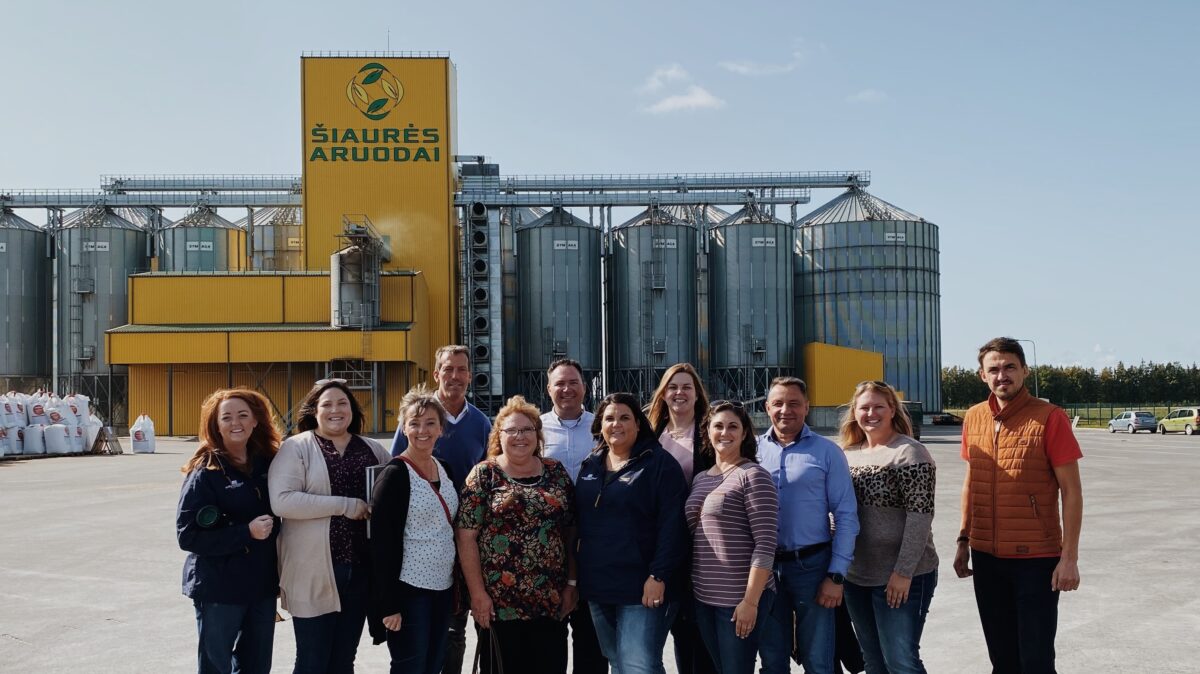Kansas Farm Bureau Program Provides Global Perspective to Grow Local Leaders
AFBF Staff

Launched in 2021, Kansas Farm Bureau’s Casten Fellows program is focused on developing individuals who can engage at the highest levels to enact change through meaningful relationships, innovation in ideas and processes, and effective leadership. The program was developed to honor the life of Kansas Farm Bureau staffer Jill Casten-Downing and her love for Kansas, agriculture, leadership development and international travel.
“As we developed the program, we knew we wanted to focus on change leadership and the ability to equip leaders to see what was possible for their communities,” explained Edie Doane, Kansas Farm Bureau director of training and development.
With room for up to 10 participants identified through a rigorous application and selection process, the 10-part program is ideal for Farm Bureau members who demonstrate a commitment to intentional life-long growth and active and long-time involvement in the organization.
“We want to know class members are ready to show up and can start at a high level of engagement,” said Leigh Ann Maurath, Kansas Farm Bureau director of leadership and field services.
Much of the program involves participants working, learning, reading and watching on their own, then coming together via Zoom to do a deep dive on their “homework,” which is laid out month-by-month in a handbook. To ensure quality remote interaction, Kansas Farm Bureau starts the fellows off with a solid in-person base during an orientation connected to the Kansas Farm Bureau annual meeting in December.
“We want them to have really good discussions throughout the year, so we set a strong foundation at orientation. We also establish expectations and do some leadership development work,” Doane said.
Each month has a different focus: January – leadership and innovation; February – change leadership; March – understanding bias; April – cultural intelligence; May – international government and agriculture systems (focused on the country/countries the fellows will be traveling to); July – international trip preparation; August – 10-14-day international experience; September-November – program impact and leadership legacy; and December – graduation. The fellows have June off as that’s a busier time for Kansas farmers.
In a nod to how Casten creatively exposed her agricultural peers to ideas and thought leaders outside of agriculture, Kansas Farm Bureau intentionally taps into leaders, perspectives and innovations from other industries.
In addition, the small group size and the number and quality of the group’s engagements ensure that the fellows know each other well enough – and have already had some of the trickier and more uncomfortable conversations – that they could maximize their learnings and bonding when they travel overseas.
The international trip includes farm visits and many conversations with people involved in the country’s or region’s agriculture.
“We think about things through the lens of rural communities, what’s working, what’s not working and what challenges they’re having. We also look at how agriculture interacts with the systems around it, especially the government system and how that impacts what people can do on their farms and ranches and in their communities,” Doane said.
The first fellow cohort went to the Baltics (Lithuania, Latvia and Estonia) in 2021 where they looked at post-Soviet culture and issues, European Union systems for agriculture, innovation on farms and in markets and developing markets.
The second cohort will travel to Uganda and Tanzania this year where they’ll dive into U.S. and international research and investment, rural challenges, ag as a solution and developing markets.
Upon returning, the fellows are encouraged to do at least three community presentations about their experience.
They’re also asked to create an artifact, which could be a journal, a scrapbook, a piece of art or something else.
“We want them to memorialize what they’ve learned throughout the program and how it’s impacted them,” Doane said.
The program is funded through a combination of funds from the Jill Casten-Downing Memorial Fund in the Kansas Farm Bureau Foundation for Agriculture, annual KFB budget dollars, partner support and participant fees. Participants are responsible for a $2,500 participant fee, which can be derived from personal finances, support from the individual’s county Farm Bureau and/or other local supporters.
Learn more at https://www.kfb.org/Get-Involved/Training/Casten-Fellows.
New Horizon Award
The Casten Fellows program garnered Kansas Farm Bureau a 2023 New Horizon Award from the American Farm Bureau Federation. The award, which honors state Farm Bureaus with the most innovative new programs, is presented annually at the AFBF Convention.